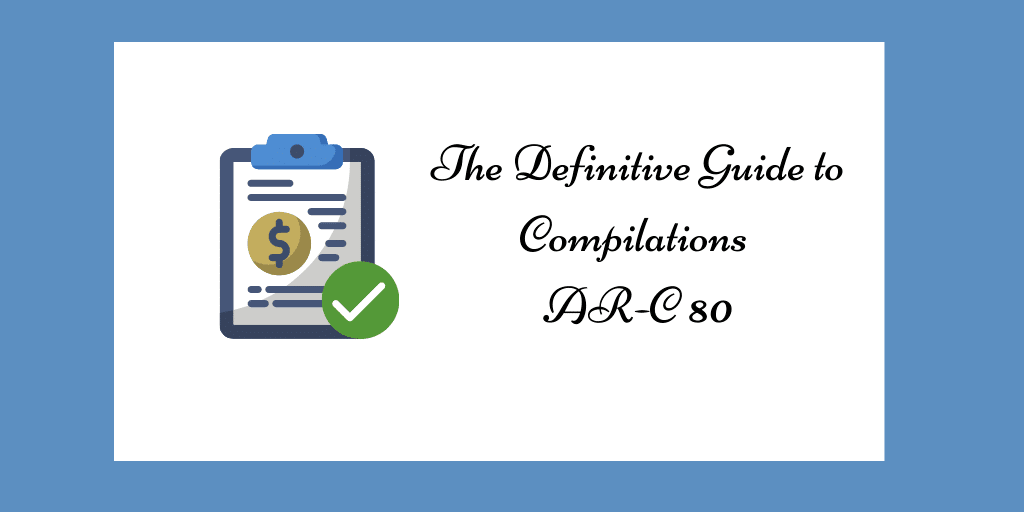Knowing how to perform compilation engagements is important for CPAs. Below I provide an overview of the salient points of AR-C 80, Compilation Engagements. I also provide a sample accountant’s compilation report.
Compilation Guidance
The guidance for compilations is located in AR-C 80, Compilation Engagements.
Applicability of AR-C 80
The accountant should perform a compilation engagement when he is engaged to do so.
A compilation engagement letter should be prepared and signed by the accountant or the accountant’s firm and management or those charged with governance. An engagement letter to only prepare financial statements is not a trigger for the performance of a compilation engagement.
Previously (in the SSARS 19 days), the preparation and submission of financial statements to a client triggered the performance of a compilation engagement. Now, compilation engagement guidance is applicable only when the accountant is engaged to (requested to) perform a compilation.
Objectives
The objectives of the accountant in a compilation engagement are to:
- Assist management in the presentation of financial statements
- Report on the financial statements in accordance with the compilation engagement section of the SSARSs
More...
Reports
In a compilation engagement, a compilation report is always required. A compilation engagement is an attest, nonassurance service. Nonassurance means the accountant is not required to verify the accuracy or completeness of the information provided by management or otherwise gather evidence to express an opinion or a conclusion on the financial statements.
The compilation report looks distinctly different from audit or review reports (which include paragraph titles such as Management Responsibility and Accountant’s Responsibility). The standard compilation report is one paragraph with no paragraph titles. (See the Sample Compilation Report section below.)
Financial Statements
The accountant prepares financial statements as directed by management or those charged with governance. The financials should be prepared using an acceptable reporting framework including any of the following:
- Cash basis
- Tax basis
- Regulatory basis
- Contractual basis
- Other basis (as long as the basis uses reasonable, logical criteria that are applied to all material items)
- Generally accepted accounting principles (GAAP)
All of the above bases of accounting, with the exception of GAAP, are referred to as special purpose frameworks. The description of special purpose frameworks may be included in:
- The financial statement titles
- The notes to the financial statements, or
- Otherwise on the face of the financial statements
Management specifies the financial statements to be prepared. The most common financial statements created include:
- Balance sheet
- Income statement
- Cash flow statement
The accountant can, if directed by management, create and issue just one financial statement (e.g., income statement).
Some bases of accounting (e.g., tax-basis) do not require the issuance of a cash flow statement.
The financial statements can be for an annual period or for a shorter or longer period. So, financial statements can be for a fiscal year, quarterly, or monthly, for example.
Should a reference to the compilation report be included at the bottom of each financial statement page (including supplementary information)? While not required, it is acceptable to add a reference such as:
- See Accountant’s Report
- See Accountant’s Compilation Report, or
- See Independent Accountant’s Compilation Report
Why add such references? The accountant’s report may become detached from the financial statements. The reference notifies the reader of the financial statement that a compilation report exists.
Compilation Documentation Requirements
The accountant should prepare and retain the following documentation:
- The engagement letter
- The financial statements, and
- The accountant’s compilation report
The accountant should document any significant consultations or judgments.
If the accountant departs from a presumptively mandatory requirement, it is necessary to document the justification for the departure and how the alternative procedures performed are sufficient to achieve the intent of the requirement. (The SSARSs use the word should to indicate a presumptively mandatory requirement.)
Engagement Letter
While it is possible for the accountant to perform only a compilation and not prepare the financial statements, most compilation engagement letters will state that the following will be performed by the accountant:
- Preparation of the financial statements (a nonattest service)
- A compilation service (an attest service)
Since a nonattest service and an attest service are being provided, the accountant will add language to the engagement letter describing the client’s responsibility for the nonattest service.
AICPA independence standards require the accountant to consider whether he is independent when he performs an attest service (e.g., compilation) and a nonattest service (e.g., preparation of financial statements) for the same client. If management does not possess the requisite skill, knowledge, and experience to oversee the preparation of the financial statements and accept responsibility, the accountant may not be independent.
Compilation Procedures
The accountant should:
- Read the financial statements in light of the accountant’s understanding of the selected financial reporting framework and the significant accounting policies adopted by management
- Consider whether the financial statements appear appropriate in form and free from obvious material misstatements
Here are examples of inappropriate form and obvious material misstatements:
- An equity account is shown in the liability section of the balance sheet
- The balance sheet does not reflect the accrual of receivables though the financial statements were supposedly prepared in accordance with GAAP
- Total assets as reflected on the balance sheet do not equal the individual items on the statement (an addition error)
- The financial statements omit a material debt disclosure, though the statements were prepared in accordance with GAAP and substantially all disclosures were to be included
Given that the focus of a compilation is the reading of the financial statements to determine if they are appropriate in form and free from obvious material misstatements, what are some procedures that are not required?
- Confirmation of cash
- Testing of subsequent receipts
- Analytical comparisons with the prior year
- Substantive analytics
- Confirmation of debt
- A search for unrecorded liabilities
Is it permissible to perform audit or review procedures while conducting a compilation engagement? While not required to do so, such procedures are allowed. If you perform audit or review procedures, be careful not to imply to the client or other parties that you are performing a service other than a compilation.
The accountant is not required to perform procedures to ensure the completeness of the client-supplied information, but what if the client provides information that is obviously not complete or contains material errors? If management-supplied information is not complete or appears incorrect, the accountant should request corrections.
Also, the accountant should request corrections if:
- The financial statements do not appropriately refer to the applicable financial reporting framework
- Revisions are necessary to comply with the selected reporting framework, or
- The financial statements are otherwise misleading
If requested or corrected information is not received or if the financial statements are not corrected, the accountant should consider withdrawing from the engagement and may wish to consult with legal counsel.
If the accountant decides not to withdraw and a material departure from the reporting framework exists, he should modify the compilation report to disclose the departure. See the example below in Reporting Known Departures from the Applicable Financial Reporting Framework.
Sample Compilation Report
The following is a sample compilation report:
Management is responsible for the accompanying financial statements of XYZ Company, which comprise the balance sheets as of December 31, 20X2 and 20X1 and the related statements of income, changes in stockholder’s equity, and cash flows for the years then ended, and the related notes to the financial statements in accordance with accounting principles generally accepted in the United States of America. I (We) have performed a compilation engagement in accordance with Statements on Standards for Accounting and Review Services promulgated by the Accounting and Review Services Committee of the AICPA. I (we) did not audit or review the financial statements nor was (were) I (we) required to perform any procedures to verify the accuracy or completeness of the information provided by management. I (we) do not express an opinion, a conclusion, nor provide any assurance on these financial statements.
[Signature of accounting firm or accountant, as appropriate]
[Accountant’s city and state]
[Report Date]
Minimum Compilation Report Elements
The compilation report should:
- Include a statement that management (owners) is (are) responsible for the financial statements
- Identify the financial statements
- Identify the entity
- Specify the date or period covered
- Include a statement that the compilation was performed in accordance with SSARS
- Include a statement that the accountant did not audit or review the financial statements nor was the accountant required to perform any procedures to verify the accuracy or completeness of the information provided by management, and does not express an opinion, a conclusion, nor provide any assurance on the financial statements
- Include the signature of the accountant or the accountant’s firm
- Include the city and state where the accountant practices and
- Include the date of the report (which should be the date the accountant completes the compilation procedures)
You may have noticed that a compilation title and salutation are not required. Can they be included? While AR-C 80 does not require a report title or a salutation, it is permissible to add them. Here’s a sample report title and salutation:
Accountant’s Compilation Report
To the Board of Directors and Management
XYZ Company
The signature on the compilation report can be manual, printed, or digital.
If the accountant’s letterhead includes the city and state where the accountant practices, then the city and state can be omitted from the bottom of the compilation report.
The date of the compilation report should be the date the accountant completes the compilation procedures.
Omission of Substantially All Disclosures
Can the accountant omit all disclosures (notes to the financial statements) in a compilation engagement? Yes. Alternatively, the accountant can provide selected disclosures or if needed, full disclosure. In short, the accountant can do any of the following:
- Omit all disclosures
- Provide selected disclosures, or
- Provide full disclosure
The compilation report should disclose the omission of substantially all disclosures with language such as the following:
Management has elected to omit substantially all the disclosures ordinarily included in financial statements prepared in accordance with the tax-basis of accounting. If the omitted disclosures were included in the financial statements, they might influence the user’s conclusions about the company’s assets, liabilities, equity, revenue, and expenses. Accordingly, the financial statements are not designed for those who are not informed about such matters.
The engagement letter should describe the level of disclosure to be included in the financial statements.
Reporting Known Departures from the Applicable Financial Reporting Framework
If the accountant becomes aware of a material departure from the basis of accounting that is not corrected, he should modify the compilation report to disclose the departure. For example:
Management is responsible for the accompanying financial statements of XYZ Company, which comprise the balance sheets as of December 31, 20X2 and 20X1 and the related statements of income, changes in stockholder’s equity, and cash flows for the years then ended, and the related notes to the financial statements in accordance with accounting principles generally accepted in the United States of America. I (We) have performed compilation engagements in accordance with Statements on Standards for Accounting and Review Services promulgated by the Accounting and Review Services Committee of the AICPA. I (we) did not audit or review the financial statements nor was (were) I (we) required to perform any procedures to verify the accuracy or completeness of the information provided by management. I (we) do not express an opinion, a conclusion, nor provide any assurance on these financial statements.
Accounting principles generally accepted in the United States of America require that material impairments in the fair value of owned property be recognized in the balance sheet. Management has informed us that a recent appraisal of its Fumbleton office reflected a fair value of $2.25 million less than carrying value. If accounting principles generally accepted in the United States of America were followed, the buildings and equity accounts would have decreased by $2.25 million.
[Signature of accounting firm or accountant, as appropriate]
[Accountant’s city and state]
[Report Date]
The effects of the departure, if known, should be disclosed in a separate paragraph of the compilation report. If the effects of the departure are not known and cannot be readily determined with the accountant’s procedures, the compilation report should include a statement that the determination has not been made by management.
The accountant may not issue a compilation report that states the financial statements (as a whole) are not presented in accordance with the applicable financial reporting framework. Doing so is considered, in effect, an adverse opinion. An adverse opinion can only be expressed in an audit engagement.
Reporting When There are Other Accountants
Other accountants might perform a compilation of a subsidiary. What is your reporting responsibility if you are performing a compilation of a consolidated entity that includes the subsidiary? The compilation report for the consolidated entity is not altered to make a reference to the other accountant. AR-C 80 is silent in regard to whether you are required to obtain a copy of the other accountant’s compilation report.
Going Concern in Compilations
If the accountant becomes aware of uncertainties with regard to an entity’s ability to continue as a going concern, he may suggest additional disclosures. Without the additional going concern disclosures, it is possible that the financial statements could be misleading.
If substantially all disclosures are omitted from the financial statements, disclosure of the going concern uncertainty is not required. Even so, the accountant should be careful not to issue financial statements that are misleading. If needed, ask management to include the requisite going concern disclosures.
If the necessary going concern disclosures are not added and the financial statements are misleading, the accountant should consider withdrawing from the engagement.
Is it permissible to include an emphasis-of-a-matter paragraph in a compilation report? Yes.
The following is an example of a going concern uncertainty paragraph that could be added to a compilation report:
Going Concern
As discussed in Note H, certain conditions indicate that the Company may be unable to continue as a going concern. The accompanying financial statements do not include any adjustments that might be necessary should the Company be unable to continue as a going concern.
Independence
Where should an accountant’s lack of independence be noted in the compilation report? The accountant can disclose his lack of independence in the last paragraph of the compilation report with wording such as:
I am (We are) not independent with respect to XYZ Company.
The reason for the lack of independence need not be included, but if the accountant includes one reason for a lack of independence, then all such reasons should be included.
If independence is impaired and the accountant desires to provide the reason independence is impaired, the compilation report may include wording such as:
We are not independent with respect to XYZ Company as of and for the year ended June 30, 2019, because an engagement team member made management decisions on behalf of XYZ Company.
Compilation Report - Special Purpose Frameworks
The compilation report should highlight the use of a special purpose framework when one is used.
If a special purpose framework is used and disclosures are included, then the compilation report should include a separate paragraph such as the following:
We draw attention to Note X in the financial statements, which describes the basis of accounting. The financial statements are prepared in accordance with the tax-basis of accounting, which is a basis of accounting other than accounting principles generally accepted in the United States of America.
If disclosures are omitted, the separate paragraph could read as follows:
The financial statements are prepared in accordance with the tax-basis of accounting, which is a basis of accounting other than accounting principles generally accepted in the United States of America.
Unless the entity elects to omit substantially all disclosures, the compilation report should be modified to describe departures when the financial statements do not contain:
- A description of the special purpose framework
- A summary of significant accounting policies
- A description of how the special purpose framework differs from GAAP
- Disclosures similar to those of GAAP
The description of the special purpose framework can be included in the titles of the financial statements or the notes. If the financial statements omit notes, the financial statement titles should include the special purpose framework; for example, Statement of Revenues and Expenses—Tax Basis.
If substantially all disclosures are omitted, then 2, 3, and 4 above are not necessary. However, the accountant should include a separate paragraph in the accountant’s compilation report stating that management elected to omit substantially all disclosures. (See the preceding section titled Omission of Substantially All Disclosures.)
Click here for more information about which special purpose framework you should use.
Other Historical Information
In addition to historical financial statements, AR-C 80 may be applied to the following:
- Specified elements, accounts, or items of a financial statement, including schedules of:
- Rents
- Royalties
- Profit participation, or
- Income tax provisions
- Supplementary information
- Required supplementary information
- Pro forma financial information
Prospective Information
AR-C 80 can be applied to prospective information.
Prospective financial information is defined as any financial information about the future.
Prospective financial information can be presented as:
- A complete set of financial statements, or
- One or more elements, items, or accounts
If you prepare prospective financial information, the summary of significant assumptions must be included Why? It is considered essential to the user’s understanding of such information.
If you prepare a financial projection, you should not exclude:
- The identification of hypothetical assumptions, or
- The description of the limitations on the usefulness of the presentation
The compilation report should include statements that:
- The forecasted or projected results may not be achieved and
- The accountant assumes no responsibility to update the report for events and circumstances occurring after the date of the report
AR-C 80 references the AICPA Guide Prospective Financial Information as suitable criteria for the preparation and presentation of prospective financial information.
Prescribed Forms
Is it permissible to perform a compilation engagement with regard to prescribed forms?
Yes. There is nothing in the SSARSs that prohibits the accountant from performing a compilation engagement with regard to prescribed forms (e.g., bank personal financial statement).
When a bank, credit union, regulatory or governmental agency, or other similar entity designs a prescribed form to meet its needs, there is a presumption that the required information is sufficient. What should be done if the prescribed form conflicts with the applicable basis of accounting? For example, what if the prescribed form requires all numbers to be in compliance with GAAP with the exception of receivables? Follow the form, and no departure from the applicable reporting framework exists. In effect, the form and its related directions are treated as though they are the applicable reporting framework. The accountant must report departures from the prescribed form and related instructions as a departure from the applicable financial reporting framework. Include any significant departures in the compilation report. (See the preceding section titled Reporting Known Departures from the Applicable Financial Reporting Framework.)
If the prescribed form includes a compilation report not in conformity with AR-C 80, the report should not be signed. Append an appropriate compilation report to the prescribed form.
Compilation Engagements Conclusion
There you have it. Now you know how to perform a compilation engagement.
The main things to remember are (1) you need a signed engagement letter, (2) always include a compilation report with the financial statements, and (3) read the financial statements to determine if they are appropriate.
If you desire to issue financial statements without a compilation report, read my article about the use of AR-C 70, The Definitive Guide to Preparations.
If you desire to issue financial statements in conjunction with a review engagement, read my article about the use of AR-C 90, Review Engagements.
Compilation Book
Check out my new SSARS book on Amazon or read about it here: New SSARS Book.






Trent, sorry to say there aren’t any low-cost options that I am aware of. They all seem to be expensive which makes it hard for smaller firms to do this type of work.
Hello Charles, I am a very small firm and only do 2-3 comps and 1-2 reviews a year. I find your material very helpful. I wanted to get your opinion on workpaper programs. I am looking for a step by step type of workpaper program. We currently use AuditFile online but it is very expensive for us. Do you sell anything like this and if not what would you recommend for a small shop like mine that does not want to spend a lot for the small volume that I do.
Hello. How do I word a date or period covered for a quarterly compilation reports? Does, for example, “for the one and six month period” work for the compilation report of the 2nd QTR ending?
Terry, I would simply perform a compilation for both years. You can disregard the prior year preparation if both years are subject to your compilation engagement.
Hi Charles
Does a compilation on comparative financials where a prior year prep was performed by a different CPA require any special disclosure in report or financial statement or understanding in the engagement letter? If you can direct me to a source I’m happy to try and find an answer. Thank you.
Rob, if you are issuing an opinion on the consolidated statements, then the group audit standards are in play and you’d need to audit all entities but from a consolidated perspective. There is no exemption for entities that were subject to the compilation standards. Basically, the compilations (since they are a no assurance services) would add little value to the audit of the consolidated entity.
Hi Charles,
We have a NFP that is being audited and has several real estate entities which it owns 100%. These real estate entities are C-corps. The real estate entities are compiled separately for the bank. What are the reporting requirements for doing the consolidation of everything? Do we have to upgrade services on the real estate entities or can we just modify the opinion to state they were compiled when preparing the consolidated statements?
Naina, I looked for an example statement as well, but did not find one.
I would identify the statements as consolidated for the prior year and I would not do so for the current year. For example, for the balance sheet I would say (in the title) Balance Sheet for the Year Ended December 31, 2018 and Consolidated Balance Sheet for the Year Ended December 31, 2017 — or I would just use the title “Balance Sheet for the Years Ending December 31, 2018 and December 31, 2017” then I woould label the columns as “2018” and “2017 Consolidated.” Either way, I would include a note explaining the sale of the subsidiary.
I would also use similar wording in the compilation report, identifying the prior year as consolidated and the current year as not.
Hello Sir
My name is Naina. I work a lot on compilations and Reviews. I have a client whose financials were consolidated in prior period and the subsidiary was closed in prior period itself. Do we need to mention consolidated for prior period and unconsolidated for current period on face of the financial statement. I have been looking for samples on how to prepare the compilation report and financials, would be great help if you can provide some guidance.
Thank you!